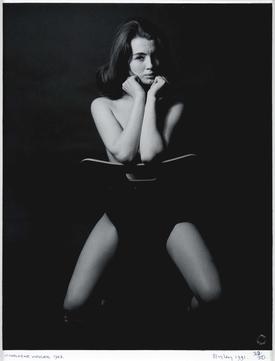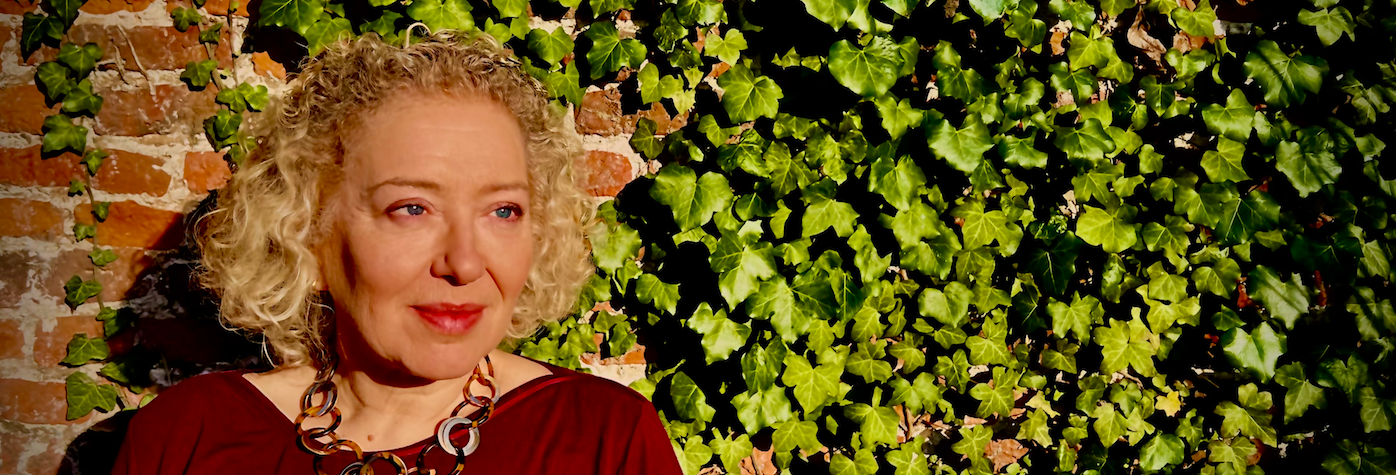
That famous photograph is lodged in all our memories – Christine Keeler naked, astride a concealing chair. And perhaps we all have our own background with this story. Ok, my husband Derek Malcolm’s memories are a bit more direct than most. As a young man on the Sixties London scene he knew Keeler and the other protagonists in the Profumo affair. (His memories tally with the claims made for this season’s new tv series, The Trial Of Christine Keeler: no, she and Mandy Rice-Davies were not ‘call girls’. Stephen Ward invited them to parties where they would meet men, but said that what did or did not come next was up to them.) Derek remembers – after it was all over – trying to get Christine a job in the Guardian offices, but she walked up and down the street, afraid to go in. He remembers Christine telling him: ‘I’ll be a footnote in history.’
I too remember, many years later at Heathrow, an elegant woman and an ageing man standing by the airport luggage carousel. An exchange of nods; and Derek hissing ‘the Profumos!’ at me. I remember, too, an afternoon ride in a west London taxi, with one of Keeler’s West Indian lovers – ‘Lucky’ Gordon, whose violence helped spark the scandal. And Gordon saying he’d tell me just one thing about the ‘man in the mask’, the supposed victim of sado-masochistic orgies who featured in the eddies of scandal around the Profumo Affair. He told me ‘it wasn’t Prince Philip’. I never thought it had been, actually. But the prince – like Kim Philby, and David Niven – had been a member of the same rip-roaring lunch club to which Stephen Ward also belonged. That was enough for the Daily Mirror to get a headline out of announcing: ‘Prince Philip and the Profumo Scandal – Rumour Utterly Unfounded’. In the frenzied witch hunt of 1963, no rumour was too wild to be in currency.
Years later, I was writing a newspaper feature about the events of those early months of 1963. Because those months saw the breaking of not one but three extraordinary scandals: two political and one personal, but all linked in the minds of press and public. All three combined to make that watershed moment – a whole season of scandals, when the first spring of a permissive society was just on the way.
It had been summer 1961 when John Profumo, an Old Harrovian government minister met good time girl Christine Keeler with her mentor – society osteopath Steven Ward – in the swimming pool at Cliveden. There too was Yevgeny Ivanov, another of Keeler’s lovers, the Russian naval attaché and spy. That summer, the affair between Profumo and Keeler flourished, amid farcical scenarios of the British minister coming to visit her by the front door as the Russian agent was leaving by the back. It all went quiet until, in autumn 1962, against a background of the Cuban missile crisis, a knife fight between two of Keeler’s other, West Indian, lovers – ‘Lucky’ Gordon, and a dope dealer called Johnny Edgecombe – brought her to the attention of the police, and the press.
It was January 1963 when Christine told the papers that if they wanted stories they should forget about the underworld squabbles, since there was another, better, story she could sell them. And the press were in the mood for just that. They were running scared – and they were angry. On the very day, February 4, that Profumo first asked colleagues whether he should resign, two journalists called Brendan Mulholland and Reg Foster were sentenced to gaol for refusing to reveal their sources over the Vassal affair.
John Vassal was a government clerk seconded to the British embassy in Moscow in 1955 and caught – he said – in a honey trap operation which saw him photographed in bed with three other naked men, and then blackmailed by the KGB over his still-illegal homosexuality. Returning to England and working in various Admiralty and Naval Intelligence offices in Whitehall he continued to leak documents to his KGB masters until his discovery, arrest, and trial in October 1962.
He was sentenced to an eighteen-year prison term on the day the Cuban Missile Crisis began. But through the following winter the case continued to spiral outwards until it triggered the resignation of a Lord of the Admiralty, and sparked something of a witch hunt in official circles – the goal, as Vassal described it, being almost less to hunt out Communist sympathisers, than to hunt out gays. But the case became almost equally significant for its effect on the relations between Westminster and Fleet Street.
Never mind that the two gaoled journalists may in fact have had no sources for their stories of Vassal buying women’s clothes in West End stores – the press were furious with Establishment forces, in the shape of Harold Macmillan’s government. As Paul Johnson wrote in the New Statesman in March: ‘any Tory minister or MP . . . who gets involved in a scandal over the next year or so, must expect – I regret to say – the full treatment.’ Not that all the prominent names who featured in the newspapers over the coming months were driven game, necessarily. In the season’s other big scandal, both husband and wife locked in a sensational divorce – both Duke and Duchess – went to the newspapers with their own stories, in a scenario evoking the more recent ‘War of the Windsors’.
For April 1963 also saw the so-called ‘divorce of the century’ (this, of course, in pre-Diana days). Margaret Whigham, the beautiful Duchess of Argyll, with her dead white skin and triangular smile, had been news ever since she was declared deb of the year in 1930. The daughter of a self-made millionaire, her first marriage to the US golfer Charles Sweeney had ended in one acrimonious row. Now her second, to the Duke of Argyll, was ending in an Edinburgh court case that convulsed the country.
This case was the culmination of a long battle in which for five years the Argylles had sued and countersued each other; the Duchess faking documentary evidence to suggest the Duke’s children by a previous marriage were illegitimate, and accusing the Duke of infidelity with her own stepmother; the Duke taking out an injunction to keep her away from his house.
The Duchess – whose ‘attitude to marriage’, the judge said, ‘was what moderns would call “enlightened”’ – had been photographed naked except for her pearls, performing fellatio on an unidentified man. His head had been clipped from the pictures but expert witnesses declared his anatomy was not that of the Duke. The blistering 40,000-word judgement declared the Duchess to be ‘a completely promiscuous woman’: the public, of course, were as interested in guessing the name of the ‘headless man’. Coincidentally or otherwise, in a newspaper interview that summer, Christine Keeler described being at a dinner party where a naked man, wearing a mask to hide his famous face, ‘waited on table like a slave’. Rumours about the identity of the masked man, too, spiralled out of control, encompassing even the Duke of Edinburgh.
Lord Denning sent for the Argyll divorce papers when preparing his report on the Profumo case, and had a confidential interview with the Duchess as well as with the five men considered most likely to be her lover. On arrival, they were each asked to sign the visitors’ book, and their handwriting was then compared with that on the labels of the headless photographs.
Lord Denning – unsatisfactory though his report now seems – concluded that the man was not, as was widely alleged, Duncan Sandys, a government minister and Winston Churchill’s son in law. Other candidates have since been revealed as a wealthy American businessman called Bill Lyons, and Douglas Fairbanks Jnr, the Hollywood star – but the Duchess’ friendship with Sandys, as well as with Anthony Eden, made any scandal in which she was involved a political story.
By the time Lord Denning’s report on the Profumo affair was published in September 1963, the unhappy scapegoat Stephen Ward was dead by his own hand; Ivanov fled; Profumo disgraced; and Harold Macmillan’s very government discredited. But interest had not even begun to die away. If the war cry of many of the press and public commentators had been the cleansing of a corrupt old establishment elite, to others the real enemy was probably the looming threat of a radical new sexual – and social – morality.
Macmillan had told Lord Denning as he began to investigate the Profumo affair, that a situation in which the public felt called upon to query the ‘honour and integrity’ of those in public life could not be tolerated – words which ring very hollow at the moment. We have now renewed debate about ministers with the very public school background derided in 1963; fresh anti-Parliamentarian cries; fresh debate, too, about the role of the press in a democracy – and about how sexual scandal does or does not colour our view of figures in the public eye.
It’s too early to say how the MeToo generation will reassess the Profumo scandal, or how the new dramatisation (written, produced and directed by women) will contribute to the debate. But certainly, as Britain, waking up to a new decade, finds itself in another period of turmoil, the issues of those frantic months of 1963 look all too relevant today.
